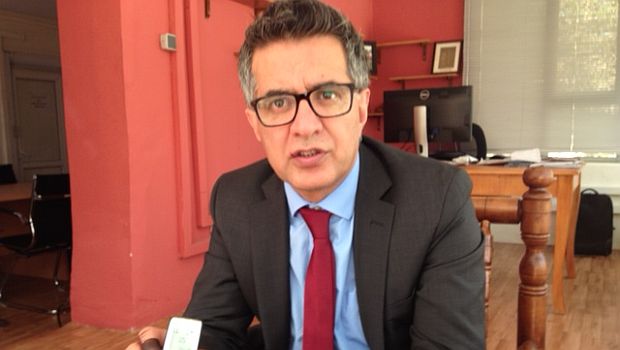
Shafic Gawhari, chief executive of Moby Group Afghanistan, talks to Asharq Al-Awsat in Kabul on April 7, 2014. (Asharq Al-Awsat)
Kabul, Asharq Al-Awsat—When Afghanistan is mentioned, “satellite TV” is perhaps the last thing on anybody’s mind. Nonetheless, the nascent broadcast media has been up and running in the war-ravaged country since the downfall of the Taliban at the hands of the US in 2001.
Some of the most prominent channels are those owned by the Moby Group, a media conglomerate set up by the Mohseni family in 2003 and headquartered in Dubai, which operates four satellite TV channels and two radio stations. One of its shows, Afghan Star, followed the wave of TV talent shows that has taken the global media by storm over the past decade, and was the subject of an award-winning documentary.
Asharq Al-Awsat spoke to Shafic Gawhari, chief executive of Moby Group Afghanistan, which is based in Kabul. Gawhari was a professional footballer, playing for the national football team, and a former advisor to the Afghan Ministry of Commerce and Industry, where he helped set up the Afghanistan Investment Support Agency and the Export Promotion Agency.
Asharq Al-Awsat: What are the three main channels you broadcast?
Shafiq Jawhari: Lamar; it means “the sun.” It is our Pashto channel. Tolo is mixed between Dari and Pashto, but Lamar is only Pashto. We also have Tolo News, which is also separate. All the political debates were on the news.
Q: How many people work here?
Eight hundred.
Q: Do you ever have threats from the Taliban or anything like that?
No, but still, we should be careful.
Q: But your programs go against the Taliban’s strategy and ideology . . .
Yes, but that’s why we have to be careful.
Q: Tell me a bit about your features and entertainment programs.
At the moment our focus is on entertainment shows, but also serials from Turkey. Our aim is to increase our own production and to invest more in our own production, so that we can make our own dramas.
Our studios are here, but we also have other big studios outside in another city for programs like The Voice and Afghan Star. Here we have studios for the news, the morning show and for smaller shows.
We currently have [a drama] called Rus Hoy Khona, which means the “Secrets of the Home,” and is about a typical Afghan family. We also have a short series of 6 episodes which is called Defenders, which is more about our police force and our special forces. It is a crime drama to honor our police force and how they are dealing with baddies.
Q: Which of your programs has been getting the most viewers and the most attention from abroad?
Afghan Star and the football are the biggest. The football has eight teams from eight regions, but the players are not necessarily from those regions. We have one from Western Afghanistan called Tufan Aridot—which means “the Storm of Aridot.” Aridot is a river in the West. We have two teams from the north, two teams from the south, a team from the east, one from central Afghanistan and one team from Kabul.
Q: Tell me a little bit about yourself. How did you end up running a TV station in Afghanistan?
I grew up in Kabul; I left Afghanistan and went to Germany during the 1980s during the communist time, when the Russians came. I did my master’s in chemical engineering and then I started working with the German Agency for Technical Cooperation, GTZ. They were also very active in Egypt and are [one of] the biggest development institutions in Germany. I was in Pakistan, and then came back to Afghanistan in 2003. During the Taliban’s time [in government] I was mostly in Pakistan, working on Afghanistan [projects] on behalf of the German development agency, but I came back to Afghanistan with my family in 2003, and I’m still here.
I worked for 10 years with GTZ in Afghanistan in different positions. When we started the project with football, they asked me if I could manage this project, because I was a former national football player here in Afghanistan, so that’s my background. And now I’m the chairman of Moby in Afghanistan.
